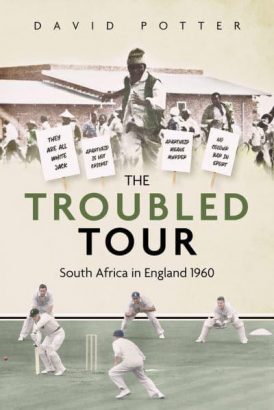The Troubled Tour
Martin Chandler |Published: 2022
Pages: 288
Author: Potter, David
Publisher: Pitch
Rating: 3.5 stars

We don’t get tour accounts anymore, which is a shame in many ways, but as I have accepted in the past I do understand why they have ceased to be attractive to readers and therefore publishers. But at least we are now getting more authors looking back at past series, a genre of cricket literature which is always popular around these parts.
The above said I will admit to not, initially, being as enthused by the visit of the 1960 South Africans to England as some other tours. The series was not a close one, England winning the first three Tests with the other two left drawn. It is inevitable that in any Test series there are a number of strong performances, and there were a few in 1960, but nothing so stellar that it became the stuff of legend.
So why has David Potter, a proud Scotsman with distinct Republican leanings, and seldom a great admirer of Englishness, chosen to cover the series? The answer to that is that he was 11 years old in 1960, and this was his first summer as a cricket tragic. It was clearly a happy time for him and, despite being a veteran of something like fifty previous titles, the pleasure he got from writing The Troubled Tour is patently obvious, and certainly rubs off on his reader.
Which brings me back to 1960, the year of my birth, so I have no actual memory of it. As importantly my father did not, when as I child I voraciously read page by page all the copies of Wisden that he owned, have the 1961 edition. So it was many years before I was aware of anything other than the bare bones of what happened.
The 1960 tour was a decade before the start of South Africa’s sporting isolation. There are references throughout the book to the protests that were already taking place by then, remarkably well mannered and peaceful by the standards of what was to come ten years later. There is a clear undercurrent of disapproval through Potter’s narrative, and he questions the actions (or rather lack of them) by the South African players on a number of occasions, particularly in light of the Sharpeville Massacre taking place less than six weeks before the touring party arrived. I did like the way he dealt with the apartheid issue, never ignoring it but concentrating primarily on cricketing matters for most of the book, before returning to apartheid in his closing retrospect in much more trenchant terms.
The account of the tour is an enjoyable one, looking at all of the tour matches rather than just the Tests, and fully exploring the most significant of the wider issues, the seemingly heartless way in which the young Springbok fast bowler, Geoff Griffin, was treated. It will be recalled that Griffin was the man who took a hat trick in the second Test at Lord’s before, in a fill in exhibition match that was slotted in to entertain the Queen after the game ended early, was no balled for throwing, a move that ended his bowling career.
In addition to his own very clear memories of the 1960 summer, Potter has looked at all the relevant source material both in book and more ephemeral form. Despite more than six decades elapsing since the tour there are three survivors, Bob Barber and Mike Smith from the England side and Peter Carlstein from the South Africans, and a contribution from one or more of them might have added something, although in truth I suspect probably not a great deal. What is present, and always a welcome feature of book of this kind, is a closing summary of how the lives and careers of the South Africans progressed after they returned home.
Potter has an entertaining writing style. He makes unusually liberal use of the exclamation mark, something I found a little disconcerting to begin with, but which I warmed to as I got used to his conversational style of writing. A large part of the reason the book is so easy to read is that doing so feels a bit like sitting in a beer garden with Potter listening to him telling the story, each of those exclamation marks being a broad smile. Given that, as they invariably do, Pitch have assisted their author to put his book into an attractive package, Potter’s retrospective is certainly one for the aficionado of the period






Leave a comment